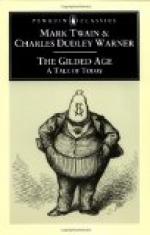“If you hadn’t levied the assessment you would have been in a close place I judge?”
“Close? Have you figured up the total of the disbursements I told you of?”
“No, I didn’t think of that.”
“Well, lets see:
Spent in Washington, say, ........... $191,000 Printing, advertising, etc., say .... $118,000 Charity, say, ....................... $16,000
Total, ............... $325,000
The money to do that with, comes from --Appropriation, ...................... $200,000
Ten per cent. assessment on capital of $1,000,000 ..................... $100,000
Total, ............... $300,000
“Which leaves us in debt some $25,000 at this moment. Salaries of home officers are still going on; also printing and advertising. Next month will show a state of things!”
“And then—burst up, I suppose?”
“By no means. Levy another assessment”
“Oh, I see. That’s dismal.”
“By no means.”
“Why isn’t it? What’s the road out?”
“Another appropriation, don’t you see?”
“Bother the appropriations. They cost more than they come to.”
“Not the next one. We’ll call for half a million—get it and go for a million the very next month.”—“Yes, but the cost of it!”
The president smiled, and patted his secret letters affectionately. He said:
“All these people are in the next Congress. We shan’t have to pay them a cent. And what is more, they will work like beavers for us—perhaps it might be to their advantage.”
Harry reflected profoundly a while. Then he said:
“We send many missionaries to lift up the benighted races of other lands. How much cheaper and better it would be if those people could only come here and drink of our civilization at its fountain head.”
“I perfectly agree with you, Mr. Beverly. Must you go? Well, good morning. Look in, when you are passing; and whenever I can give you any information about our affairs and pro’spects, I shall be glad to do it.”
Harry’s letter was not a long one, but it contained at least the calamitous figures that came out in the above conversation. The Colonel found himself in a rather uncomfortable place—no $1,200 salary forthcoming; and himself held responsible for half of the $9,640 due the workmen, to say nothing of being in debt to the company to the extent of nearly $4,000. Polly’s heart was nearly broken; the “blues” returned in fearful force, and she had to go out of the room to hide the tears that nothing could keep back now.
There was mourning in another quarter, too, for Louise had a letter. Washington had refused, at the last moment, to take $40,000 for the Tennessee Land, and had demanded $150,000! So the trade fell through, and now Washington was wailing because he had been so foolish. But he wrote that his man might probably return to the city soon, and then he meant to sell to him, sure, even if he had to take $10,000. Louise had a good cry-several of them, indeed—and the family charitably forebore to make any comments that would increase her grief.




